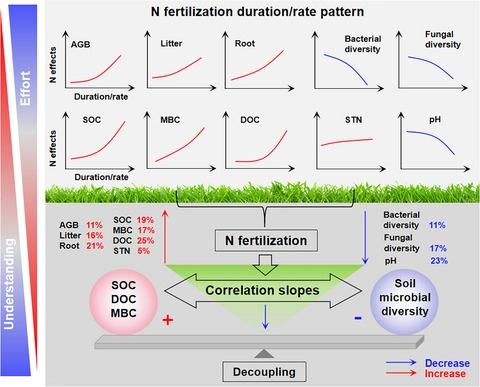当前位置:
X-MOL 学术
›
Glob. Change Biol.
›
论文详情
Our official English website, www.x-mol.net, welcomes your feedback! (Note: you will need to create a separate account there.)
Nitrogen fertilization weakens the linkage between soil carbon and microbial diversity: A global meta-analysis
Global Change Biology ( IF 11.6 ) Pub Date : 2022-07-29 , DOI: 10.1111/gcb.16361 Yang Yang 1, 2, 3 , Xinli Chen 4 , Liangxu Liu 1, 5 , Ting Li 6 , Yanxing Dou 7 , Jiangbo Qiao 7 , Yunqiang Wang 1, 2, 3 , Shaoshan An 7 , Scott X Chang 4
Global Change Biology ( IF 11.6 ) Pub Date : 2022-07-29 , DOI: 10.1111/gcb.16361 Yang Yang 1, 2, 3 , Xinli Chen 4 , Liangxu Liu 1, 5 , Ting Li 6 , Yanxing Dou 7 , Jiangbo Qiao 7 , Yunqiang Wang 1, 2, 3 , Shaoshan An 7 , Scott X Chang 4
Affiliation

|
Soil microbes make up a significant portion of the genetic diversity and play a critical role in belowground carbon (C) cycling in terrestrial ecosystems. Soil microbial diversity and organic C are often tightly coupled in C cycling processes; however, this coupling can be weakened or broken by rapid global change. A global meta-analysis was performed with 1148 paired comparisons extracted from 229 articles published between January 1998 and December 2021 to determine how nitrogen (N) fertilization affects the relationship between soil C content and microbial diversity in terrestrial ecosystems. We found that N fertilization decreased soil bacterial (−11%) and fungal diversity (−17%), but increased soil organic C (SOC) (+19%), microbial biomass C (MBC) (+17%), and dissolved organic C (DOC) (+25%) across different ecosystems. Organic N (urea) fertilization had a greater effect on SOC, MBC, DOC, and bacterial and fungal diversity than inorganic N fertilization. Most importantly, soil microbial diversity decreased with increasing SOC, MBC, and DOC, and the absolute values of the correlation coefficients decreased with increasing N fertilization rate and duration, suggesting that N fertilization weakened the linkage between soil C and microbial diversity. The weakened linkage might negatively impact essential ecosystem services under high rates of N fertilization; this understanding is important for mitigating the negative impact of global N enrichment on soil C cycling.
中文翻译:

施氮肥削弱了土壤碳与微生物多样性之间的联系:一项全球荟萃分析
土壤微生物构成了遗传多样性的重要组成部分,并在陆地生态系统的地下碳 (C) 循环中发挥关键作用。土壤微生物多样性和有机碳在碳循环过程中通常紧密耦合;然而,快速的全球变化可能会削弱或破坏这种耦合。对 1998 年 1 月至 2021 年 12 月发表的 229 篇文章中提取的 1148 项配对比较进行了全球荟萃分析,以确定氮 (N) 施肥如何影响陆地生态系统中土壤碳含量与微生物多样性之间的关系。我们发现施氮肥降低了土壤细菌 (-11%) 和真菌多样性 (-17%),但增加了土壤有机碳 (SOC) (+19%)、微生物生物量 C (MBC) (+17%) 和溶解不同生态系统中的有机碳 (DOC) (+25%)。与无机氮肥相比,有机氮(尿素)施肥对 SOC、MBC、DOC 以及细菌和真菌多样性的影响更大。最重要的是,土壤微生物多样性随着SOC、MBC和DOC的增加而降低,相关系数的绝对值随着施氮量和施氮时间的增加而降低,表明施氮削弱了土壤碳与微生物多样性之间的联系。在高施氮率的情况下,削弱的联系可能会对基本的生态系统服务产生负面影响;这种认识对于减轻全球氮富集对土壤碳循环的负面影响很重要。并且相关系数的绝对值随着施氮量和施氮时间的增加而减小,表明施氮削弱了土壤碳与微生物多样性之间的联系。在高施氮率的情况下,削弱的联系可能会对基本的生态系统服务产生负面影响;这种认识对于减轻全球氮富集对土壤碳循环的负面影响很重要。并且相关系数的绝对值随着施氮量和施氮时间的增加而减小,表明施氮削弱了土壤碳与微生物多样性之间的联系。在高施氮率的情况下,削弱的联系可能会对基本的生态系统服务产生负面影响;这种认识对于减轻全球氮富集对土壤碳循环的负面影响很重要。
更新日期:2022-07-29
中文翻译:

施氮肥削弱了土壤碳与微生物多样性之间的联系:一项全球荟萃分析
土壤微生物构成了遗传多样性的重要组成部分,并在陆地生态系统的地下碳 (C) 循环中发挥关键作用。土壤微生物多样性和有机碳在碳循环过程中通常紧密耦合;然而,快速的全球变化可能会削弱或破坏这种耦合。对 1998 年 1 月至 2021 年 12 月发表的 229 篇文章中提取的 1148 项配对比较进行了全球荟萃分析,以确定氮 (N) 施肥如何影响陆地生态系统中土壤碳含量与微生物多样性之间的关系。我们发现施氮肥降低了土壤细菌 (-11%) 和真菌多样性 (-17%),但增加了土壤有机碳 (SOC) (+19%)、微生物生物量 C (MBC) (+17%) 和溶解不同生态系统中的有机碳 (DOC) (+25%)。与无机氮肥相比,有机氮(尿素)施肥对 SOC、MBC、DOC 以及细菌和真菌多样性的影响更大。最重要的是,土壤微生物多样性随着SOC、MBC和DOC的增加而降低,相关系数的绝对值随着施氮量和施氮时间的增加而降低,表明施氮削弱了土壤碳与微生物多样性之间的联系。在高施氮率的情况下,削弱的联系可能会对基本的生态系统服务产生负面影响;这种认识对于减轻全球氮富集对土壤碳循环的负面影响很重要。并且相关系数的绝对值随着施氮量和施氮时间的增加而减小,表明施氮削弱了土壤碳与微生物多样性之间的联系。在高施氮率的情况下,削弱的联系可能会对基本的生态系统服务产生负面影响;这种认识对于减轻全球氮富集对土壤碳循环的负面影响很重要。并且相关系数的绝对值随着施氮量和施氮时间的增加而减小,表明施氮削弱了土壤碳与微生物多样性之间的联系。在高施氮率的情况下,削弱的联系可能会对基本的生态系统服务产生负面影响;这种认识对于减轻全球氮富集对土壤碳循环的负面影响很重要。



























 京公网安备 11010802027423号
京公网安备 11010802027423号